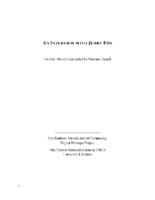Search the Special Collections and Archives Portal
Search Results

Transcript of interview with Dayvid Figler by Barbara Tabach, June 22, 2016
Date
Archival Collection
Description
Dayvid Figler (1967 - ) is the quiet boy who became an insightful and creative contributor to the local culture of Las Vegas. The oldest of Barbara and Meyer Figler?s three children, he was four years old when the family station wagon reached Las Vegas in 1971. They moved in with Uncle Izzy (aka Big Irish) Figler for a few months. Having the ?juice,? Dayvid?s father soon became a Pan dealer on the Strip. As the family grew, Barbara eventually immersed her energies in her children?s activities, Hadassah and Temple Beth Sholom. In this oral history, Dayvid also recalls his awkward, but incredibly interesting youth, his bar mitzvah at Temple Beth Sholom, and path to a successful career as a criminal defense attorney. He also talks about embracing Las Vegas as his home, owning a home in John S. Park neighborhood and mentions a number of literary depictions of Las Vegas that he admires. Dayvid describes growing up a ?casino kid? who lived in an apartment near the Riviera Hotel. This, in addition to his slight stature and academic brilliance, may have set him apart from many of his childhood peers. He graduated from Valley High School at the age of 16 and by the age of 23 he was a rising star in the legal world. He looks back with appreciation to his list of mentors who encouraged him along the way. Dayvid is also a local favorite as an essayist and poet. For a number of years he could be heard on KNPR/NPR. He has been a performer in hundreds of productions that featured his comic wit and writings, from Lollapalooza to Tom and Jerry?s on Maryland Parkway.
Text

Transcript of interview with Jerry Fox by Barbara Tabach, November 12, 2014
Date
Archival Collection
Description
Interview with Jerry Fox by Barbara Tabach on November 12, 2014. In this interview, Fox discusses his father's restaurant, Foxy's Delicatessen, which opened on the Las Vegas Strip in the 1950s, and his own business endeavors including the Tinder Box and an embroidery business.
Jerry Fox grew up in Los Angeles until his family moved to Las Vegas in February 1955, where his father opened Foxy's Delicatessen, the city's first Jewish deli. Jerry would go on to follow in his father's entrepreneurial footsteps, operating several ventures across different industries, including his own restaurant, Foxy Dog. Jerry sold Foxy Dog in 1975 after going through a divorce, the same year that Foxy's Deli closed.
Text

Transcript of interview with Cindy Coletti and David Fordham by Stefani Evans and Claytee White, October 27, 2016
Date
Archival Collection
Description
The interior of the green house at the end of the cul-de-sac envelops the visitor. Every room exudes comfort and encourages conversation even as the lake, lapping quietly on three sides of the house, beckons. Cindy Coletti revels in this house and its interiors, all of her own design, especially because they are so different from the daring, opulent, and award-winning custom homes for which she is known. Arriving in Las Vegas in 1988 as a single mother, Cindy immediately submitted a successful design for the first Southern Nevada Street of Dreams event and began networking. She established Sun West Custom Homes in Nevada by applying the design and contracting skills she had successfully honed by building nearly seventy houses in California, Florida, and Colorado—all the while grooming her son Danny—from the time he was in his teens—to eventually take over the company. In this interview, Cindy's husband, David Fordham, shares his background, his reasons for relocating to Las Vegas, work in commercial real estate, meeting Cindy, and living at The Lakes. Cindy then recalls the experiences that brought her to Las Vegas; shaped her ideas of self-help, friendship, design, and business, and instilled in her the confidence to succeed in a man's world. Cindy has retired from building and now enjoys traveling with her husband, but Sun West Custom Homes continues to thrive under the capable ownership and leadership of Daniel S. Coletti.
Text

Transcript of interview with Cheryl Leonard by Claytee White, February 12, 2013
Date
Archival Collection
Description
First arriving in Las Vegas as an infant, Cheryl Leonard's young life included a brief sojourn in Southern California before returning to Las Vegas in 1954. After attending local elementary and middle schools, she started at Rancho High during the day, and working at the Huntridge theater in the evenings and during the summers. More than just work, though - in this interview, Cheryl recalls school activities from parades to pep club, participating in Helldorado, hanging out with her friends at the Blue Onion and shopping on Fremont Street. After graduation, Cheryl returned to California to attend school before coming back to Las Vegas and taking a job with the Central Telephone Company. This was followed by a brief stint working at the Nevada Test Site before she married in 1964 and concentrated on raising her own daughters in a rapidly growing and changing Las Vegas.
Text

Paul M. Lytle interview, March 8, 1995 transcript
Date
Archival Collection
Description
Lytle discusses his birth in Salt Lake City, Utah, his early life in Overton, Nevada, moving around the Southwest United States, and returning to Overton in the early 1930s to work with the Civilian Conservation Corps. Subjects Lytle also talks about in the interview include road and campsite construction at the Valley of Fire State Park, stories about associates and relatives, and being enlisted as a male nurse with the United States Army during World War II. Lastly, Lytle talks about the construction of an exhibit building at Hoover Dam (Boulder Dam) originally used as a headquarters for soldiers during World War II to protect the dam.
Text

Transcript of interview with Julie Menard by Joyce Marshall, March 17, 1996
Date
Archival Collection
Description
Julie Menard began her career as a showgirl in 1964, performing in the Folies Bergere at the Tropicana Hotel. Although she appeared in the show for only sixteen months, she offers an insider’s view of the early Las Vegas entertainment scene. She describes a period when showgirls were treated as local royalty and “the boys” wielded considerable influence. Menard’s narrative sheds light on the glamour and complexities of the showgirl. Her descriptions of physical characteristics of the job, the day to day work schedules, the expectations of physical beauty, as well as the stigma of her occupation outside of Las Vegas offer a fuller view of the job. Menard left Las Vegas in 1966 to pursue a film career in Europe but like many Las Vegas entertainers, she returned to make the desert city her home. Although her brief performing career failed to prepare her for future employment, she relishes her brief experience as a showgirl. Her narrative evokes the glamour, excitement and mystery of Las
Text

Transcript of interview with Toshiyuki "George" Goto by Christina Oda, February 26, 1979
Date
Archival Collection
Description
On February 26, 1979, Christina Oda interviewed Toshiyuki “George” Goto (born 1922 in Huntington Beach, California) about his life in Nevada. Goto first talks about his move to Nevada in 1951 before talking about his family, church activities, politics, and recreational activities. He then discusses the building, economic, and environmental changes in Las Vegas. Goto later talks in depth about his profession in landscaping, including the work he completed for some of the hotels and resorts built on the Las Vegas Strip. The latter part of the interview includes discussion about Goto’s Japanese ancestry and his perceptions as a minority when first moving to and living in Las Vegas. The interview’s conclusion covers the topics of social activities and Goto’s organization of a local chapter of the Japanese American Citizens League.
Text

Transcript of interview with Vivian Harwell by Pamela Atkins, February 27, 1979
Date
Description
On February 27th, 1979, Pamela Atkins interviewed Vivian Harwell in Las Vegas, Nevada. Harwell begins the interview by explaining her reasons for moving to Las Vegas from Arkansas, and the type of living quarters that she had. She then goes on to talk about the recreation in Las Vegas in addition to the Nevada Test Site and local politics. The two later discuss the convenience of having local colleges available in Las Vegas and the availability of children’s activities in Las Vegas. The interview concludes with Harwell’s personal reflection on her time living in Las Vegas, and that she does not regret moving to Las Vegas.
Text

Transcript of interview with Catherine Hunt by Dennis Hunt, March 2, 1980
Date
Archival Collection
Description
On March 2, 1980, Dennis Hunt interviewed his mother, Catherine Hunt (born August 25, 1932 in Palmyra, Missouri) about her life in Southern Nevada. The two discuss Catherine Hunt’s work as a secretary before becoming a housewife. The interview concludes with Catherine Hunt’s thoughts on population growth, women’s rights, and the Equal Rights Amendment.
Text

Transcript of interview with Dorothy Kelsey by James M. Greene, January 20, 1975
Date
Archival Collection
Description
On January 20, 1975, collector James M. Greene interviewed housewife, Dorothy Kelsey (born May 28, 1916 in Kingman, Arizona) in her home in Nelson, Nevada. This interview covers the early days of Nelson, Searchlight, and Las Vegas, as Mrs. Kelsey offers an in-depth personal narrative on the life of a local old-timer. The interview concludes with a discussion on hotels and casinos.
Text
